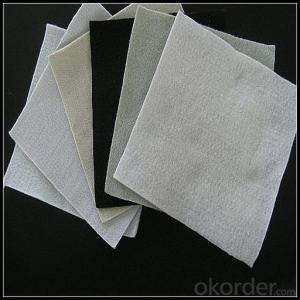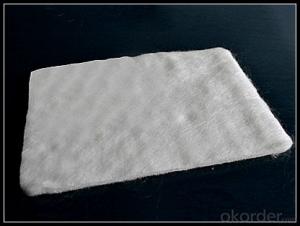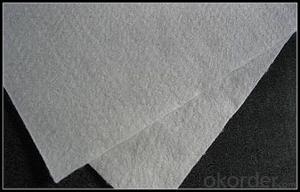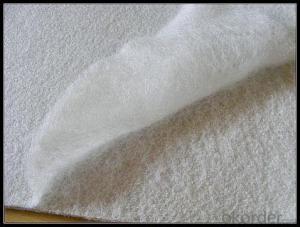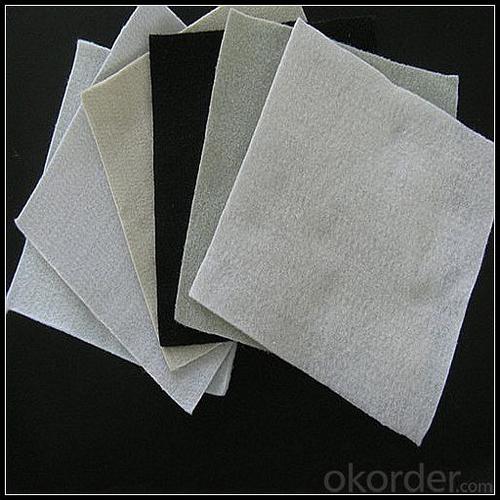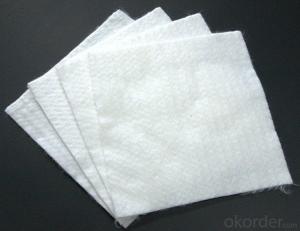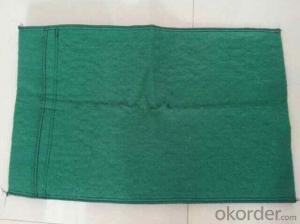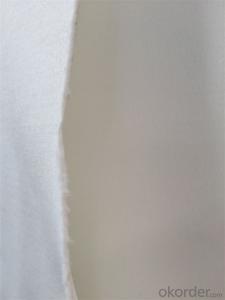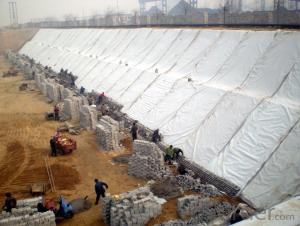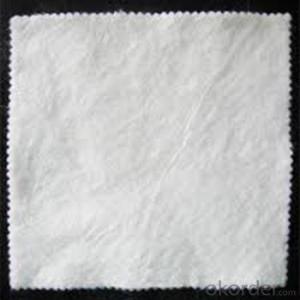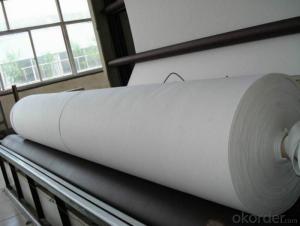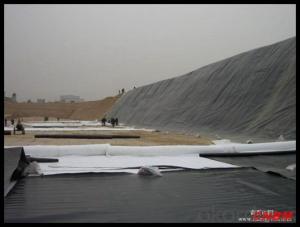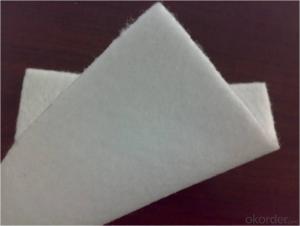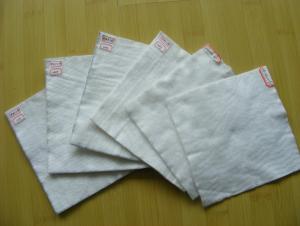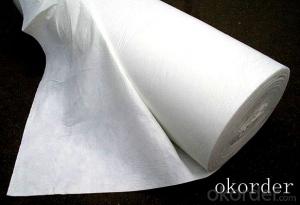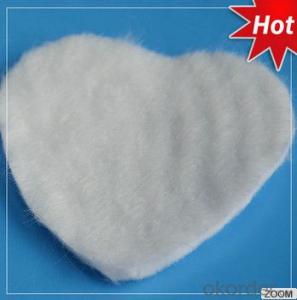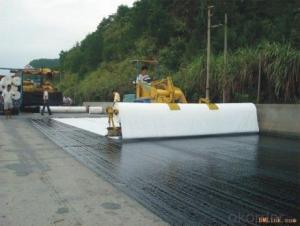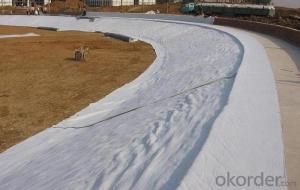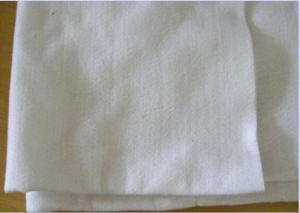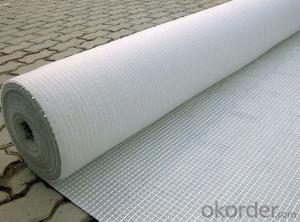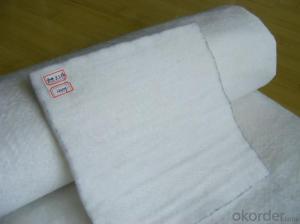500g Nonwoven Geotextile Fabric - Geotextil Costa Rica
- Loading Port:
- China main port
- Payment Terms:
- TT OR LC
- Min Order Qty:
- 1000 m²
- Supply Capability:
- 1000000 m²/month
OKorder Service Pledge
OKorder Financial Service
You Might Also Like
Specification
Nonwoven geotextiles consist of fibers that are continuous filament or short staple fibers. These fibers are then Nonwoven geotextiles Image bonded together by various processes that can include a needling process that intertwines the fibers physically (needlepunched), or a chemical / thermal bonding operation that fuses adjacent fibers together. The resulting nonwoven geotextiles have a random fiber orientation with high porosity and permeability, but indirect and unpredictable openings, a thickness ranging from thick felt to a relatively thin fabric, and low modulus and high elongation (needlepunched).
Geotextiles form one of the two largest group of geosynthetics. Their rise in growth during the past fifteen years has been nothing short of awesome. They are indeed textiles in the traditional sense, but consist of synthetic fibers rather than natural ones such as cotton, wool, or silk. Thus biodegradation is not a problem. These synthetic fibers are made into a flexible, porous fabric by standard weaving machinery or are matted together in a random, or nonwoven, manner. Some are also knit.
Detailed Images
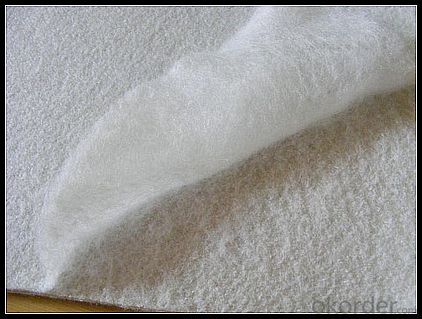
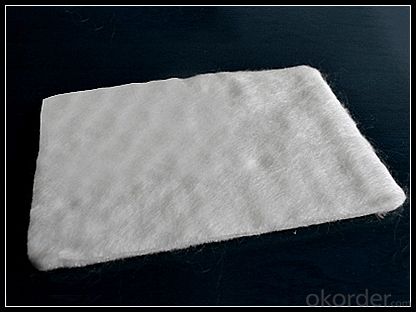
Packaging & Shipping
Packing: PLASTIC FILM INSIDE, AND WOVEN BAG OUTSIDE
Shipping: About 15 days after receipt the deposit
geotextile fabric
permeability,filtration,easy for construction
ISO and CE certificate
Good quality and competitive price
Our Service
Quality assurance
1.On a regular basis or as per your request,we entrust national testing agencies to conduct quality inspections
2. Strictly in accordance with the ISO9001-2008 international quality system standard,we monitor and manage the whole process throughout production,quality testing,and measurement to ensure product quality
3. For quality-related construction delay or substandard construction(except for damage or losses due to customer’s responsibility or irresistible natural disasters),we have refunding,replacement,and repair services.We will respond to customers’ feedbacks on quality issues within 24 hours.
After-sales service
1.In order to provide customers with comprehensive technical support,we will provide technical and other related information upon request in a timely manner.
2.In required,we will appoint specialized technicians to the construction site to give technical trainings to construction people,and offer technical guidance throughout the whole construction process.
3.For damage due to shipment and delivery,after we receive the complaint,we will check the issure through provided pictures and videos.If our responsibility is confirmed,we wil offer free replacement.
4.When the construction is completed,as your request,our technical staff may participate in the final acceptance.
FAQ:
Q: What kind of payments does jenor support?
A: T/T, L/C, Cash are accepted.
Q: Do you charge for the samples?
A: Accordeing to our company policy, the samples are free, we only charge the freight fee. And we will return the freight fee during the next order.
Q: Can you produce according to customers' design?
A: Sure, we are professional manufacturer, OEM and ODM are both welcome.
Q: Do you have other products?
A: Yes, please check the pictures:
- Q: How do geotextiles help in stabilizing railroad tracks?
- Geotextiles help in stabilizing railroad tracks by providing reinforcement and separation between the subgrade and the ballast layer. They prevent the mixing of fine particles from the subgrade with the ballast, thereby maintaining its integrity and preventing track settlement. Geotextiles also distribute the load evenly, reducing the stress on the subgrade and improving track stability and longevity.
- Q: What are the considerations for geotextile selection in mining operations?
- When selecting geotextiles for mining operations, several key considerations should be taken into account. These include the specific requirements of the mining site, such as the type of minerals being mined and the environmental conditions present. The geotextile's strength and durability are crucial factors, as it needs to withstand the heavy loads and harsh conditions associated with mining activities. Additionally, the geotextile's filtration properties and permeability should be assessed, as they play a vital role in controlling water flow and preventing soil erosion. Compatibility with other materials and the cost-effectiveness of the geotextile should also be considered during the selection process. Overall, choosing the right geotextile for mining operations requires a comprehensive evaluation of the site's unique characteristics and performance requirements.
- Q: What are the key factors affecting the durability of geotextiles?
- The key factors affecting the durability of geotextiles include exposure to environmental conditions such as ultraviolet (UV) radiation, temperature variations, moisture, and chemical exposure. The quality of the geotextile material and its resistance to degradation, abrasion, and puncture also play a crucial role in determining its durability. Proper installation, maintenance, and adherence to design specifications are additional factors that can impact the longevity of geotextiles.
- Q: How do geotextiles help with soil stabilization in slope stabilization projects?
- Geotextiles play a crucial role in soil stabilization during slope stabilization projects. They are designed to be placed between layers of soil to enhance their structural stability. Geotextiles act as a barrier, preventing soil erosion and promoting water drainage. By providing reinforcement, they distribute the load across a wider area, reducing the pressure on the slope and minimizing the risk of landslides. Additionally, geotextiles help to retain moisture in the soil, which aids in vegetation growth, further strengthening the slope. Overall, geotextiles are an effective solution for soil stabilization in slope stabilization projects.
- Q: Are geotextiles effective in preventing weed growth?
- Yes, geotextiles are effective in preventing weed growth. Geotextiles act as a barrier, blocking weed seeds from reaching the soil and germinating. They also prevent sunlight from reaching the weeds, further inhibiting their growth. Additionally, geotextiles allow for proper water drainage and soil aeration, improving overall plant health.
- Q: How do geotextiles help with soil stabilization in foundation construction?
- Geotextiles help with soil stabilization in foundation construction by providing reinforcement and separation functions. They act as a barrier between different soil layers, preventing their intermixing and maintaining their structural integrity. Additionally, geotextiles improve the load-bearing capacity of the soil by distributing the applied loads more evenly, reducing settlement and increasing stability.
- Q: How do geotextiles improve the performance of geogrids?
- Geotextiles improve the performance of geogrids by acting as a separator, preventing the mixing of different soil layers and allowing for better load distribution. They also provide filtration, allowing water to pass through while preventing the migration of fine particles, which helps in maintaining the stability and longevity of the geogrid. Additionally, geotextiles act as a cushioning layer, reducing the potential for damage to the geogrid and enhancing its overall effectiveness in reinforcement applications.
- Q: How do geotextiles improve the stability of slopes?
- Geotextiles improve slope stability by providing reinforcement and erosion control. They are placed within the slope to act as a barrier against soil movement, preventing erosion and enhancing the overall stability of the slope. Additionally, geotextiles help to distribute loads more evenly, reducing the potential for slope failure.
- Q: What is the length of the lap when the two-way geogrid is used? What is the geotextile lap length?
- Two-way lap length is 50cm, nailed. Geotextile lap length is 50cm to 1m
- Q: Can geotextiles be used for erosion control in river channels?
- Yes, geotextiles can be used for erosion control in river channels. Geotextiles are permeable fabrics that are designed to stabilize soil and prevent erosion by providing structural support and enhancing filtration. They can be installed in river channels to control erosion by reinforcing the riverbanks, protecting against scouring, and promoting vegetation growth. Geotextiles can effectively reduce sediment transport and maintain the stability of river channels, making them a suitable option for erosion control in these environments.
Send your message to us
500g Nonwoven Geotextile Fabric - Geotextil Costa Rica
- Loading Port:
- China main port
- Payment Terms:
- TT OR LC
- Min Order Qty:
- 1000 m²
- Supply Capability:
- 1000000 m²/month
OKorder Service Pledge
OKorder Financial Service
Similar products
Hot products
Hot Searches
Related keywords
